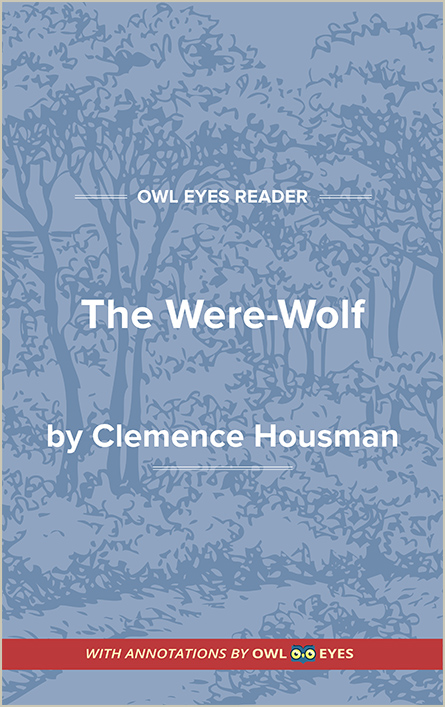Analysis Pages
Literary Devices in The Were-Wolf
Dramatic Irony: Dramatic irony occurs when readers of a text know something that some or all of the characters do not. Because of the shifting point of view used by Housman, readers are privy to information from a variety of characters early on—most importantly, White Fell’s true nature is revealed long before it is confirmed for all the characters, which makes Christian and Sweyn’s disagreement over her identity more tense.
Point of View: The point of view used in the story is third-person omniscient. The perspective first attaches itself to Rol and Sweyn, giving us glimpses of White Fell’s true nature until Christian arrives. With Christian’s arrival, the narration sticks to his perspective for the majority of the story and then returns to Sweyn just before the story’s end. The jumping perspective heightens the mystery and drama. Although readers know who is telling the truth and who is misinterpreting evidence, the characters do not, which increases the feeling of suspense.
Symbolism: From his name to his actions, Christian is a symbolic representation of the biblical figure Jesus Christ. Christian is selfless, driven to great sacrifice on behalf of those he loves. Descriptions of his body and his love for his brother recall biblical passages, and the last sentence of the story makes the comparison explicit. Consequently, White Fell can be read as a symbolizing death, temptation, and sin—which Christian must overcome to save his brother.
Literary Devices Examples in The Were-Wolf:
The Were-Wolf
🔒"The ring of despair and anguish in his tone angered Sweyn, misconstruing it. Jealousy urging to such presumption was intolerable...." See in text (The Were-Wolf)
"Sweyn in his heart felt positive that it was...." See in text (The Were-Wolf)
"Straight on—straight on towards the farm...." See in text (The Were-Wolf)
"the absent Christian was hastening his return...." See in text (The Were-Wolf)
"so that none could see its expression. It had lighted up with a most awful glee...." See in text (The Were-Wolf)
"And then the wind would rage after its lost prey, and rush round the house, rattling and shrieking at window and door...." See in text (The Were-Wolf)
"A few moments later Sweyn of the long legs felt a small hand caressing his foot,..." See in text (The Were-Wolf)

